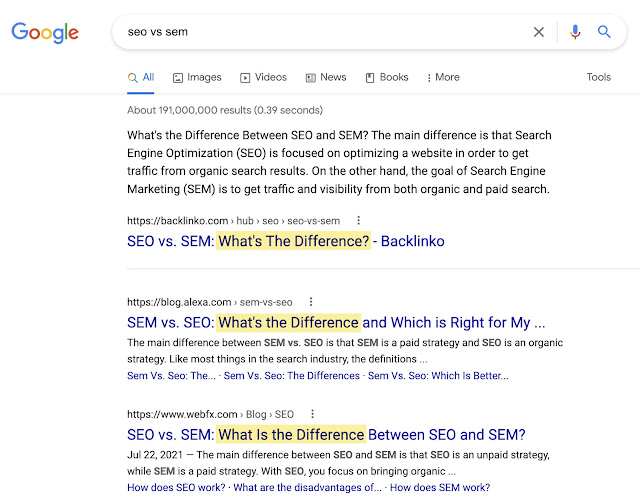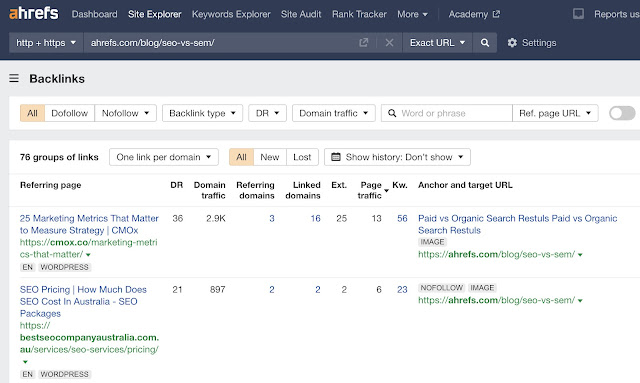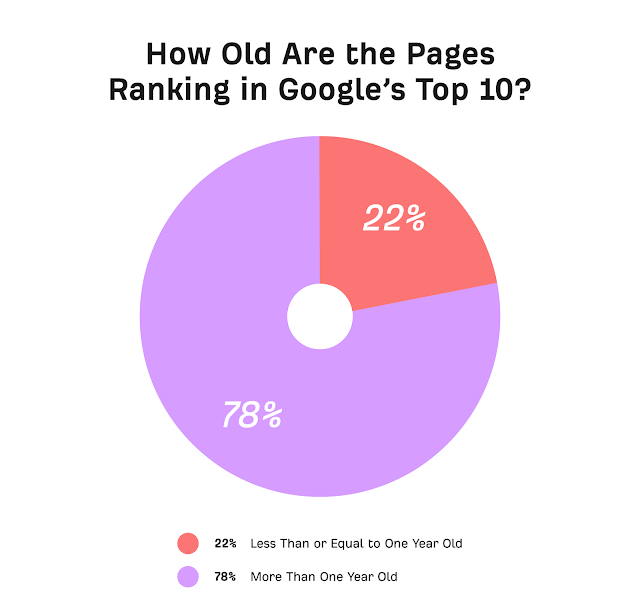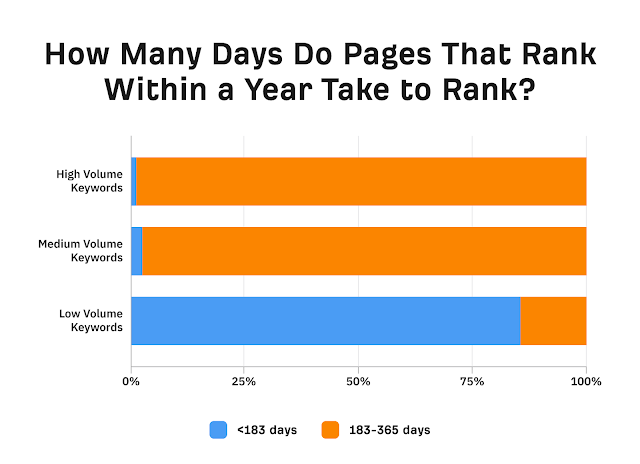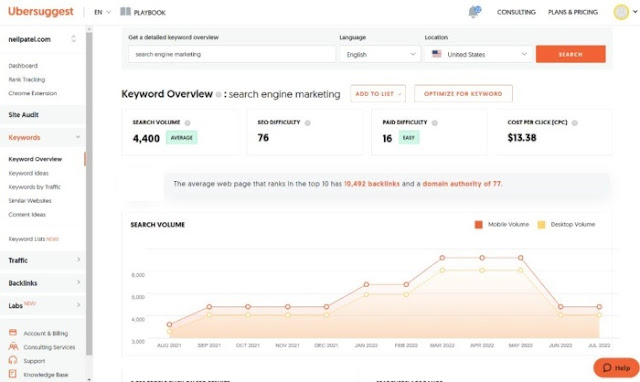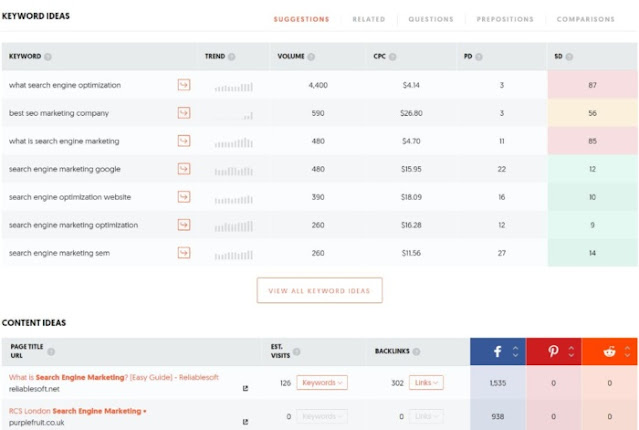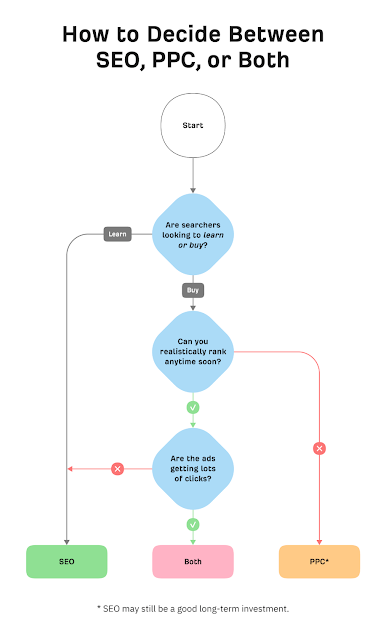SEO vs SEM for Niche Markets or Small Business, Is it important ? SEO vs SEM which is better for beginners. To Rank 1 SEO vs SEM for Niche Markets Paid & Free.
SEO vs SEM for Niche Markets
The main difference is that search engine optimization (SEO) focuses on optimizing a website to get traffic from organic search results. On the other hand, Search Engine Marketing (SEM) aims to gain traffic and visibility from both organic and paid search.
The goal of SEO is to rank your website in organic search results.
You can also get your website in the paid area of search results through Pay Per Click (PPC).
SEO is where you focus 100% on ranking in organic results. SEM is when you leverage both SEO and PPC to get traffic from search engines.
So yes, SEM is a broad term that encompasses SEO and PPC. Which means that SEO falls under the general category of SEM.
With that explained, let’s look at some of the key differences between SEM vs SEO for niche markets.
Difference Between SEO vs SEM/PPC for Niche Markets
As we know, SEO is Search Engine Optimization.
However, marketers are not optimizing for search engines. We are optimizing content and websites for search engines (and humans too), so that they can better understand, access and direct search engines to our website.
Again, origins don’t always make sense. So naturally it’s a bit illogical.
Like other things in life that don’t always add up, there are some acronyms that won’t make any sense.
Like Humvee, which doesn’t represent any word starting with U or E. (Actually, it stands for High Mobility Multipurpose Wheeled Vehicle, and is derived from the original acronym HMMWV.)
SEO is the organic effort that goes into marketing via search engines.
SEM & PPC are paid campaigns by search and other platforms.
If you want to read more to choose one of them then read this table below, in this table you can read features of SEO & SEM for niche market or small business compare between them easily.
In this 2nd table you can read, consider and choose which one is best for your niche market or small businesses.
What is SEO ? (Search Engine Optimization)
For Niche Market SEO helps websites rank higher in search engines by improving their content and structure, generating more traffic and sales. Techniques include keyword research, on-page optimization, and link building.
Natural sharing: When others share your content without you promoting it.
Helpful content: Creating content your audience enjoys can help your website rank higher in search results.
Google indexing: Making your website easy for Google to understand and find your content.
Relevant keywords: Using words your audience searches for in your content can help your website show up in relevant search results.
There are many types of SEO (Search Engine Optimization) but in this series we can only discuss four main types of SEO.
1- Keyword Research
2- On-page SEO
3- Off-page SEO
4- Technical SEO
Here are the complete details of SEO types to get higher traffic or rank 1 in search engine.
1- Keyword Research
Keyword research is all about understanding the words and phrases your customers are typing into search engines. You can do this with keyword research tools such as Ahrefs, SEmrush & more.
Some factors:
Find popular words people use to search for your website’s topic.
Use keyword tools to find popular keywords.
Focus on using longer, specific phrases called long-tail keywords.
Put keywords in your website’s content to help it appear in search results.
2- On-page SEO
On-page SEO optimizes web pages for search engines by optimizing content, tags, URLs, images and links. The goal is to make pages more relevant and authoritative for specific search queries, which can increase website traffic.
Some factors:
Make sure your content is relevant to specific search queries.
Create a clear and easy-to-navigate structure for your web pages.
Use unique and valuable content that your audience will find useful.
Include keywords in strategic locations such as titles, headings, meta descriptions, and text.
Use short and readable URLs that accurately describe the content of the page.
3- Off-page SEO
Off-page SEO is where you do things outside of your site to show Google that your pages deserve to be ranked. Building high-quality backlinks is one of the most effective off-page SEO tasks because backlinks are one of the top three ranking factors in Google. They work just like votes on other websites.
Some factors:
Backlinks from other websites
Social media engagement related to your website
Listing your website on relevant online directories
Positive brand mentions on other websites
Guest blogging on other relevant websites
Positive reviews of your brand on review websites
4- Technical SEO
Technical SEO is about making sure that search engines can find, crawl and index your content. Unless the search engines can do all three of these things, you are unlikely to rank.
Some factors:
Quick website loading for better rankings.
Mobile device-friendly website for better rankings.
Organized website structure for easy crawling by search engines.
File that lists all website pages for search engines to easily index.
File that directs search engines which pages to crawl or avoid.
Secure protocol to improve rankings and protect user data.
Good
Increases brand awareness
Strong branding
More trust and credibility
Lower cost
Better ROI
High-quality Click Through rate
Evil
Time-consuming
Highly competitive
May require the help of a digital agency
Needs regular backlinking
SEO is not a component of SEM in Niche Market.
And while PPC is often the largest and most demanding component of SEM, both PPC and SEM are paid initiatives that offer real-time data, ROI, and secure data that only advertisers on certain platforms can get. is accessible to
What is PPC ? (Pay-Per-Click)
PPC (Pay Per Click) is a form of advertising where you pay for website clicks from popular platforms. In the case of SEM, search engines such as Google.
Here, the four main Google involves advertising of PPC.
1- Keyword research
2- Bid setting
3- Ad creation
4- Audience targeting
1- Keyword research
When you keywords research for Google ads, you need to know more than what customers are searching for. You should also research how much advertising is likely to cost, as it can vary depending on the keyword.
2- Bid setting
Bid settings are where you decide how much you’re willing to pay Google to click on an ad. If your competitors outrank you and you have just as (or more) relevant ads, Google won’t show your ad as much and you won’t get as many clicks.
3- Ad creation
Advertising is the process of ad creation to promote a company or its products. Once created, advertising can help a business promote a brand, generate leads and sales, and shape its image.
4- Audience targeting
Audience targeting is where you decide who should see your ad. You can target people based on who they are, what they’re interested in, where they’re located, and more. Here’s more about Google Audience Targeting.
What is SEM ? (Search Engine Marketing)
SEM (Search Engine Marketing) is where you drive traffic from search engines to your site. You can generate this traffic from organic or paid results, or both. Use SEO to get traffic from organic results and Pay Per Click (PPC) to get traffic from paid results.
Good
Appear at the top
More control
Advertise better
Targeted ads
Quick and noticeable results
Low-cost leads
Real-time feedback
Evil
Expensive
Continuous investment
Tough competition
How much does SEM cost & how long does it take?
SEM is not free. There are costs associated with search engine marketing, whether you’re doing SEO or PPC.
SEO vs SEM which is best for you and how much does SEM cost.
If you’re doing PPC, every click costs you money. More clicks = more spend.
If you’re doing SEO, clicks are “free” after you rank. But setting up takes time and effort.
For example, our SEO Stats list is currently ranked #1 for “SEO Stats”. And it has consistently been in the top five for the past 12 months.
SEM can be fast or slow. Depending on whether you are using SEO or PPC.
PPC is instant. Google will immediately start showing your ad to search engines, so you can start generating traffic within minutes.
SEO is slow. Very slow then SEM.
In fact, our study of 2 million keywords showed that only 22% of the top 10 pages were published in a year.
What’s the Similarity Between SEO vs SEM for Niche Markets
Help your brand appear at the top of search engine results.
Drive more traffic to your website.
This requires prior knowledge and research about your target market and audience.
Rely on keywords to promote your website.
Using keywords is used to target a specific audience.
Rely on trial and error and regular improvement.
How do they Complement Each Other ?
They may seem to do the same thing, but in reality both are different ways to get visibility on SERPs. As we see in this table in the overview and content views of them.
Is it Important?
Consistency is the main reason why these terms need to be clarified.
Many new marketers, or marketers who are not experts in maximizing value through search, have taken these industry definitions and crossed, combined, confused, or used them in a similar way. What has weakened their real meaning further.
And even seasoned marketers who simply didn’t agree with the terms or possibly didn’t fully understand them helped turn the tide.
Conferences have built entire portions of their educational offerings around the SEM naming convention when it comes to strictly paid marketing efforts, but those efforts are not strictly driven by search engines.
At least from this perspective, SEM includes PPC advertising on search engines but also on third-party platforms such as Amazon and YouTube, as well as industry-focused platforms such as Houzz, Thumbtack, or Yelp. This also includes display advertising and remarketing efforts.
Should I be Using SEO or SEM?
Now that you hopefully know the difference between SEO and SEM, you’re no doubt asking yourself one question: which one should I use?
Ideally both. But if you don’t have the bandwidth and can only pick one, here are some things to consider:
What are your goals?
If you’re looking to generate traffic quickly, whether it’s to boost sales, test a new offer, or simply give your website more exposure, SEM is the option for you.
On the other hand, SEO is a marathon, not a sprint. It takes longer to show results, but this is good for long-term growth and compounding value.
What is your budget? SEM Budget Diagram
Obviously, SEM campaigns are going to pay you. After all, there’s a reason it’s called pay-per-click.
If your budgets are tight or you have low product margins, then running SEM may not make sense.
SEO, on the other hand, is more of a time investment than a financial one. And you can probably recruit people already on your payroll, such as writers, IT staff, and marketers, to help you.
How is your site currently performing?
If your website already ranks highly for your keywords, your SEO needs will be primarily driven by changes in Google’s algorithm and competition.
In this situation, SEM is a big advantage. Conversely, if you’re not getting much organic traffic, you probably need to get your SEO in order before you start spending money on paid advertising.
How much data do you have or need about visitors?
SEM allows you to get much more visitor data than organic search.
You can run your PPC campaign through dashboards like Google Analytics, where you can view clicks, impressions, CTR, sessions, conversions, etc.
You can then use this data to track trends and attract new customers.
How is your online reputation?
SEO is one of the best ways to control the narrative around your brand.
By using the same techniques you use to climb the search rankings, you can control the way your organization appears online.
In one famous (albeit unsuccessful) example, UC-Davis paid $175,000 to a consulting firm to clean the Internet of negative posts.
Result
Hopefully, at this point, we have successfully impressed you on the difference between SEO and SEM. But if it wasn’t clear, here’s another time for the folks behind:
SEO is using free tactics to systematically drive traffic to your website. This is a slow process (typically three to six months), but it can pay dividends in the long run.
SEM, including PPC, is the use of paid search platforms to drive targeted traffic to your website. This requires a budget, but can produce results very quickly.
Many people view these as the same or completely separate measures and miss the benefits of using them together.
For best results, both should be part of your digital marketing strategy.
Each of these has different strengths and weaknesses, but when put together correctly, they can give you a real competitive advantage.



